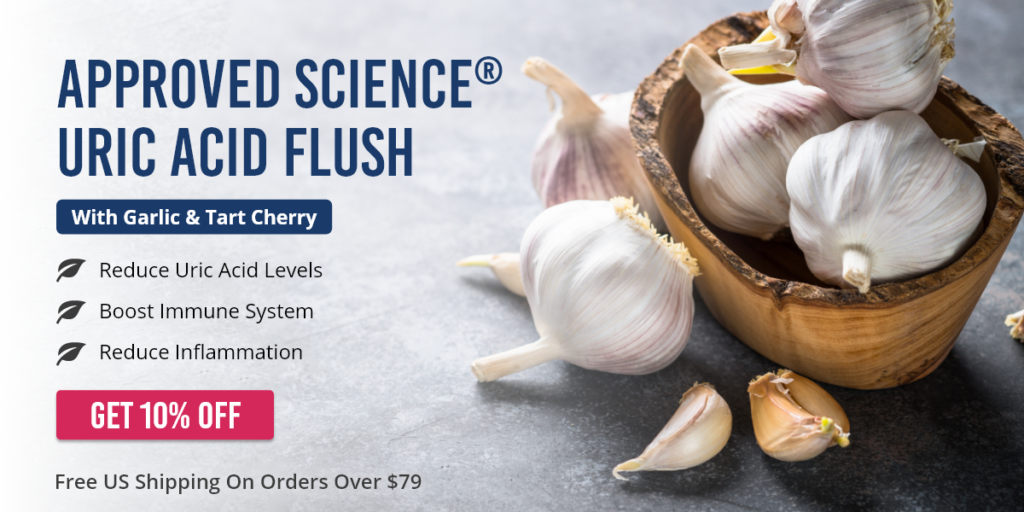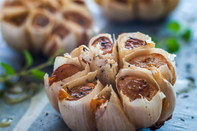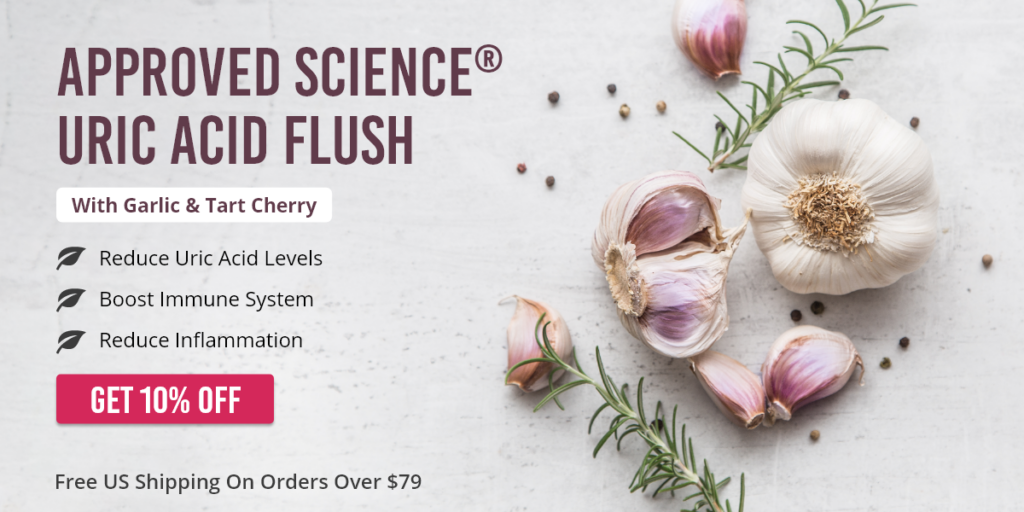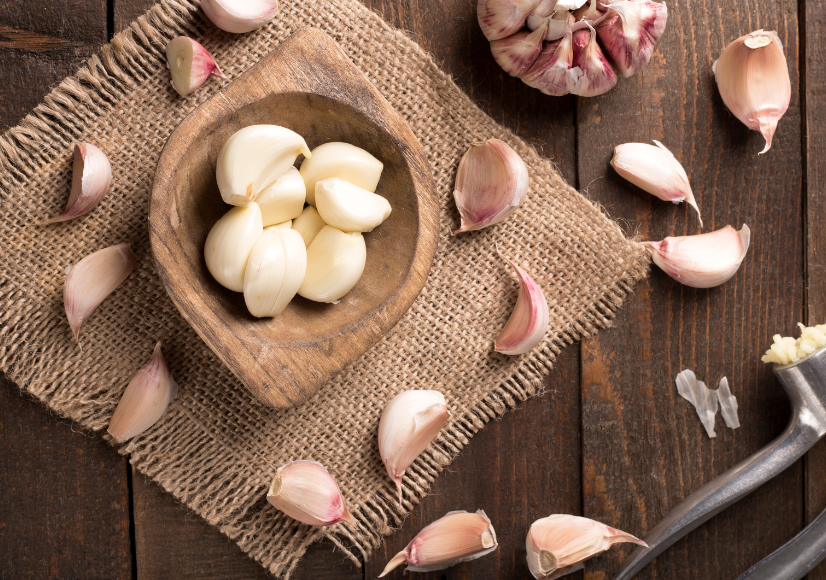If you’re wondering if garlic is good for gout, I have some good news for you. It is! Garlic is more than a tasty food, it’s also good for health! While research suggests that Garlic may not be effective for warding off vampires (1), it has been found to have protective properties against gout. Garlic is an amazing natural remedy that has been used for centuries to treat a wide range of ailments, including gout. Not only does Garlic have a delicious flavor, it also has numerous health benefits that can help relieve symptoms and reduce the risk of gout. Keep reading for a closer look at why Garlic is so good for gout and how to incorporate it into your daily diet.
Gout Got You Down? See How Our Customers Are Kicking It To The Curb
What Is Gout?

Gout is a type of arthritis that is the result of too much uric acid in the blood. It occurs when uric acid crystals form around joints. This causes extreme pain, swelling, redness, and warmth in the affected areas. Symptoms typically last days to weeks at a time and can recur periodically. Common areas of the body affected by gout are the big toe, ankles, knees, and hands. Risk factors for developing gout include being overweight, having high levels of uric acid in the blood, eating too many purine-rich foods, and having a family history of gout.
What Are The Benefits Of Garlic?
Garlic is an incredibly versatile and beneficial food. It is full of vitamins and minerals like Vitamin C, Vitamin B6, Manganese, and Selenium, as well as antioxidants and allicin (2). Garlic has many health benefits, such as reducing inflammation, improving heart health, and fighting off infections (3). Studies have shown that Garlic can reduce uric acid levels in the body (4), thereby helping to reduce the pain and swelling associated with gout. Additionally, Garlic may help the body to detox from heavy metals such as lead (5) -how cool is that?!

How Is Garlic Good For Gout?
Garlic contains allicin, an active compound with antioxidant properties. Allicin has been shown to reduce inflammation (6), thus it might be it beneficial for gout sufferers, as gout is an inflammatory disease. In addition, garlic is a natural antibiotic and has anti-fungal and anti-viral properties (7). This makes it beneficial for those with gout, since it can help ward off infections. Furthermore, Garlic also helps to boost the immune system (7), thus helping the body to fight off infection and heal faster. By reducing inflammation and providing antifungal, antiviral, antioxidant, and immune-boosting benefits, Garlic may help ease the discomfort associated with gout. Additionally, its ability to lower blood pressure and cholesterol (2) may also reduce the risk of long-term complications associated with gout.
How To Take Garlic For Gout?

Garlic is a versatile food and you can mix up how you eat so that it’s always fresh and exciting. (Of course, Garlic is always exciting, no matter how you prepare it.) While there’s no set amount for how much Garlic to take for gout, many sources recommend crushing and consuming 1 to 2 cloves of Garlic per day. Cutting or crushing fresh Garlic offers the highest percentage of allicin, a compound that is responsible for many health benefits. However, if plain fresh garlic slices aren’t your thing, you can add slices or powder into your dishes -be they soup or salad (as all foods are (8)). You can also roast Garlic for a delicious snack, spread, or side dish. Alternatively, a Garlic-containing supplement may be an effective way to get your Garlic fix without having to incorporate it into your dishes. This is a good option, especially if you don’t like the taste of Garlic.
Before you dramatically increase your Garlic intake, you should be aware that Garlic is known to have a natural blood-thinning effect. Additionally, excessive allicin intake may cause liver toxicity. This means that, unfortunately, there is a thing as too much Garlic. Consult with your advising doctor before attempting to treat gout with Garlic consumption.
Other Helpful Tips For Combating Gout
1. Cut Out Purine Rich Foods
Since high uric acid is the cause of gout and uric acid is the byproduct of purine-breakdown, the first thing you want to do is reduce your intake of purine-rich foods. For example, organ meats like liver and kidney as well as many types of seafood are high in purines (9). Cut back on alcohol, especially beer, if you’re managing gout. You should also limit your intake of fructose-rich drinks and snacks.
2. Consume Foods And Drinks That Decrease Flare-Ups
In addition to cutting out purine-rich foods, there are some drinks and foods (like Garlic) that can actually be added into your diet to decrease the risk of gout flare-ups. In fact, some of them might already be part of your diet. For example, there is research that indicates regular coffee consumption helps lower uric acid levels (10). But coffee isn’t the only drink that can help. Maintaining healthy hydration by drinking water can help your body to flush out uric acid.
One of the top recommended foods for gout is cherries. These juicy red fruits are a powerhouse of nutrients. Research has found that people with gout who regularly consumed tart cherry juice or extract experienced fewer gout flare-ups (11). The anthocyanins in tart cherries provide antioxidant benefits and help inhibit inflammatory enzymes which can help improve cases of gout (11).
3. Take A Supplement For Gout
Supplements can be a great, easy way to fight gout. With supplements, it’s easy to get clinically-recommended dosages of nutrients that help fight gout. Allow me to introduce Uric Acid Flush:

Approved Science® Uric Acid Flush contains 220mg of Garlic extract as well as 400 mg of Tart Cherry to help reduce uric acid levels. It also contains Folate which neutralizes the enzyme that produces uric acid. To fight inflammation, it includes ingredients such as Turmeric, Artichoke, Yucca Root, and Rutin. Lastly, Milk Thistle and Dandelion extracts support kidney and liver function which may help with gout because the kidneys and liver filter uric acid out of the body. Order now for 10% off your order!

